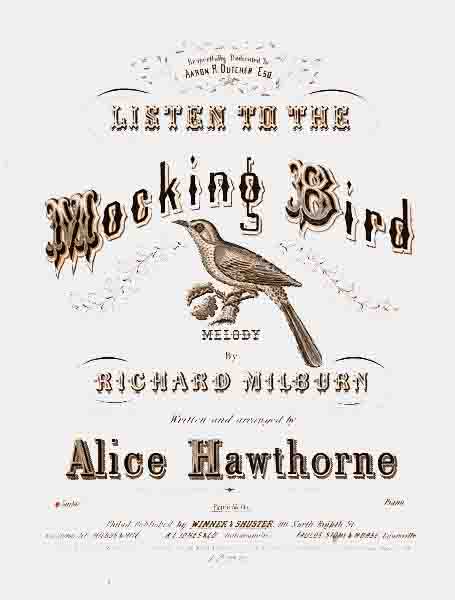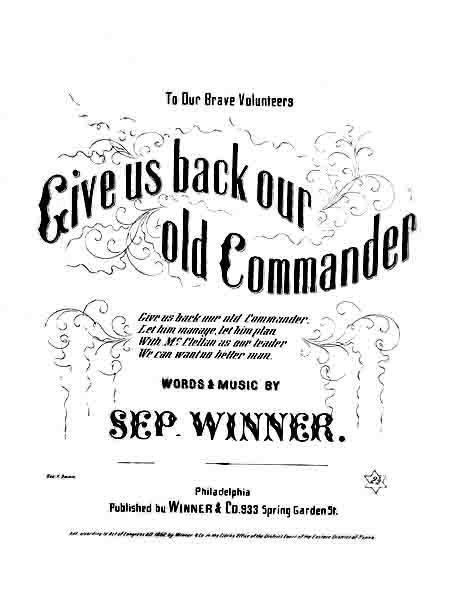Songwriting and Treason
Few
Americans today, while reminiscing about going to camp or riding on a bus somewhere
as children, would fail to recognize the words: "Ten Little Indians, standing
in a line. Take one away, and then there were nine." How about, "Oh
where, O where has my little dog gone? Oh where, Oh where can he be?" They
were both composed by Septimus Winner, a composer and songwriter from the Civil
War period. 
Born on May 11 of 1827 in Philadelphia, Septimus was a student of the violin, who mastered many instruments, opened a music store by the age of twenty, and gave music lessons on a variety of instruments. He composed many songs, and had his first hit with "What is Home Without a Mother?" when he was 26 years of age. A year later, to a score by Richard Milburn, an African-American Philadelphia barber, he wrote the lyrics to his most famous song, which was very popular among the troops and is extremely well known to this day. The song? "Listen to the Mocking Bird." Winner frequently used the pen name of "Alice Hawthorne" on his work, as he did with this particular song. He also provided the words for "Johnny is Gone for a Soldier" and "Abraham's Daughter."
Among the many instructional music books he published are: Winner's Primary School Fife (1872), Winner's New School for the Fife (1870), Winner's New American School for the Fife (1883), The Ideal Method for the Fife (1883), Winner's Tunes for the Fife (1887), and The American Fife Instructor (1888). All of these publications are in the library of the Company of Fifers and Drummers, Ivoryton, CT.
Years
later, at a time when the war wasn't going all that well for the Union, President
Lincoln tired of the endless delays of General George McClellan and relieved him
of command. Winner disagreed with Honest Abe and composed another song which is
not quite as well known as Mocking Bird. It was called "Give us back our
old Commander," and he published it under his name rather than that of the
fictional "Alice Hawthorne." It quickly sold many tens of thousands
of copies. However, not using a pen name may have been a grievous mistake!
Article I of the United States Constitution, Sections 8 and 9, has a provision for suspension of habeas corpus in the case of "rebellion or invasion." Lincoln requested suspension and got it from the Congress. Habeas is that component of English and American law that guarantees a suspect a hearing or an arraignment prior to being held for trial and its origins can be traced to the Magna Carta of 1215. When suspended, the suspect can be jailed without being charged with a crime at the pleasure of the government. The Lincoln Administration immediately set to work, and incarcerated numerous newspaper editors and other "malcontents" who disagreed with the government's policies. It was just about this time that Septimus Winner came along with and published "Give us back our old Commander," the lyrics of which are critical of the fact that Lincoln had suspended Gen. McClellan. He was soon caught up in the web and jailed for treasonous activity and demoralizing the troops. He was never officially charged with treason...when habeas corpus is suspended, there is no need for charges. Suspicion is enough. He was released a few months later.
During Grant's first campaign the tune, with modified lyrics, was used as one of his campaign songs. Winner died in 1902. Considering the response the song received from the Lincoln Administration, I have serious doubts that it would have ever been performed by any army units during the war. However, Listen to the Mocking Bird was played frequently. "Mocking Bird" was the signature tune of the Virginia 1st Infantry Regiment (CSA).


Considering much of the legislation enacted in 2002 by the Congress, some songwriters of today might consider publishing their music under the name of "Alice Hawthorne," unless that happens to be their real name!
Septimus
Winner was inducted into the Songwriters
Hall of Fame in 1970.
(c)E.W.Boyle, 2003